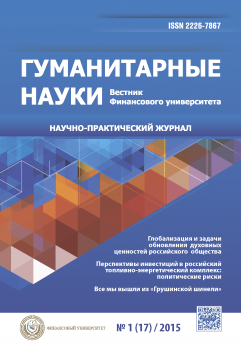The paper concerns the paradigm of Russia’s development in terms of globalization. An attempt is made to answer the question, whether the humankind is to exist or not to exist as the unity of the many. Transformations of society in terms of the global world and contradictory tendencies of its development are being analyzed. As it is revealed, the practice of humanity’s movement towards world community not only causes fear of cultural homogeneity resulting from the privation of the peculiarities of traditional cultures around the globe, but also causes a serious tendency for various human communities to preserve their national identity. Essentially, a new stage in the historical dynamics of national identities begins in the XXI century, which is predetermined by the globally proliferating process of democratization of socio-political systems that, in particular, contributes to the enhancement of the rights of ethnic minorities, religious confessions and denominations. It is pointed out that in Russia, a special role in the apprehension of this problem is played by the ideas and philosophic heritage of the Eurasians, who maintained that universal human culture can only be created through the creation of a multinational culture, and emphasized that universal human progress should not be realized entirely through cultural and social unification of peoples. It is asserted that the concept of globalization as a unifying tendency in civilizational development is a methodological delusion, by the reason that the ethno-national and religious complexity of the contemporary world demands the implementation of a dialogue, real and productive, the outcome of which would demand to break the framework of national development whilst keeping its peculiarities, i.e., seek for the unity of the many. The creation of the Eurasian “continental federation” on the basis of the ideology of tolerance is considered as one of possible effective instruments of the adequate reaction of national states to new challenges of globalizational development. The ideology of tolerance has got the new understanding as a system of principles and new mechanisms to support diversity in the evolution of various complex systems, the potential of development, co-existence, interaction, co-operation, mutual assistance and consolidation of various social communities. This ideology ensures sustainable development of humanity inside those systems as the unity of the multitude in the global world, as well as the balance and harmonization of interests between opposing sides in ideology, politics, economy, and also in any other form of interpersonal, social and political interrelation of individuals and social groups. It makes it possible for everyone to determine the right and value of being different. It is concluded that the ideology of tolerance is but the substantial basis for the being of peoples, nationalities, states, religions and outlooks in the global world, without which the preservation of their unity and multitude is hardly possible. It helps enhance the range of capacities possessed by those systems in various unpredictable situations.
globalization, ideology, paradigm, substantial basis, tolerance.
1. Uchitel’skaya gazeta [Teacher’s newspaper]. Available at: http://www.ug.ru/archive/ug/2011/36 (Accedded: 23 July).
2. Bek U. 2001. Chto takoe globalizatsiya? [What is globalization?]. Moscow, Progress-Tradition Publ., 2001. 296 p.
3. Chumakov A.N. Global’noe obshchestvo kontury tselostnogo mira [Global Society outlines a holistic world]. Moscow, Prospekt Publ., 2005. 430 p.
4. Kishlakova N.M., Makhamatov T.M. Grazhdanskoe obshchestvo i struktura grazhdanstva [Civil society and the structure of citizenship]. Filosofiya i kul’tura [Philosophy and culture]. 2012. № 8 (56).
5. Kishlakova N.M. Etnicheskaya identichnost’ kak sposob vyzhivaniya v global’nom mire [Ethnic identity as a means of survival in a globalized world]. Vopros natsional’noy identichnosti v kontekste globalizatsii: sb. nauchnykh statey [The question of national identity in the context of globalization: a collection of scientifi c articles]. Moscow, Prospectus Publ., 2014.
6. Makhamatov T.M. Ob”ektivnye osnovaniya natsional’noy identichnosti kak samopoznaniya [The objective foundation of the national identity as a self]. Vopros natsional’noy identichnosti v kontekste globalizatsii: sb. nauchnykh statey [The question of national identity in the context of globalization: a collection of scientifi c articles]. Moscow, Prospectus Publ., 2014.
7. Vodolagin A.V., Danilov S.I. Metafizicheskaya os’ evraziystva [Metaphysical Eurasian axis]. Tver, 1994. 93 p.
8. Mirimonova M.S. Tolerantnost’ kak fenomen individual’nyy i sotsial’nyy [Tolerance as a phenomenon of individual and social]. Moscow, Prometheus Publ., 2004. 253 p.
9.
10.
11.
12.
13.
14.
15.
16.





